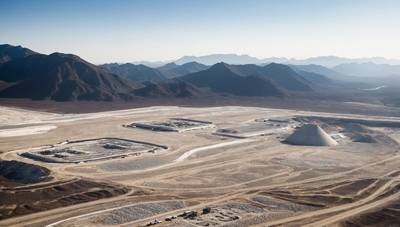As yttrium shortages grow, a new rare earth crisis is on the horizon
Due to Chinese export restrictions on yttrium, global supplies are in short supply. This has led to fears of shortages, and a rise in costs, which could affect aerospace, energy, and semiconductor production.
In April, China, which is the primary source of this element, used in coatings that protect against high temperatures and in alloys for engines, limited exports, along with six others rare earths, in response to U.S. duties.
The dispute is not fully resolved despite the high-stakes summit between U.S. president Donald Trump and Chinese president Xi Jinping last month.
While China has now ceased some of its restrictions on rare earths, the controls from April remain in place. This raises questions about U.S. access in the absence a comprehensive agreement between Washington and Beijing.
According to Ellie Saklatvla, Argus analyst and four rare earth traders, the controls that require exporters obtain licenses from Beijing have made it difficult to get yttrium outside of China.
Saklatvla stated that the licenses granted so far were for small shipments, and that there are still delays in getting materials delivered.
'SCRAMBLE FOR YTTRIUM'
"China's export control has undoubtedly led to a scramble after yttrium, which continues months later," Saklatvla stated.
Argus data shows that European prices for yttrium dioxide, which is used in heat-shielding coatings, have risen 4,400% to $270 per kilogram since January. Chinese prices are around $7 per kilogram and have risen by 16% over the same period, but they're still falling.
The U.S. Aerospace Industries Association, a trade group in the United States, said that yttrium is essential for jet engines of the highest technology and was working with Washington on expanding domestic supply.
Dak Hardwick is the vice president of international affairs at AIA. He said, "At this time, our supply chain relies heavily on imports, which has led to rising prices and shortages."
Two industry sources have said that shortages are also a big concern for the semiconductor sector, where yttrium serves as an insulator and protective coating. One source rated it as "9 out 10" for severity.
Richard Thurston of Great Lakes Semiconductor said that yttrium shortages will increase production costs, slow down equipment, and cause it to be less efficient. However, he did not expect immediate shutdowns. He added that the problems are likely to be more severe for larger producers.
He said that shortages will become more and more of a problem.
Gas turbine blades can be protected from high temperatures by yttrium-coated blades.
Mitsubishi Heavy, a major producer of gas turbines, said that its business was not affected by China's new restrictions on rare earth exports.
Siemens Energy CEO Christian Bruch stated that the company is working to diversify away from Chinese rare Earths in general, but it will take some time.
We haven't seen any direct impacts on our supply chain yet. "We are watching the situation with great concern, but we can still handle it at this time."
GE Vernova has not responded to any questions.
STOCKS AWAY FROM CHINA
Customs data from September shows that China's exports of yttrium to the U.S. have slowed down since April, and then stopped altogether.
A yttrium dealer said that exports to other countries have fallen by about 30% in the past year. However, supplies to the U.S. are unlikely because traders and companies are worried China will restrict its own shipments as a form of retaliation.
Information about stocks outside China is inconsistent and opaque. Six sources in the industry gave estimates that ranged from one month to twelve months of consumption. Many sources said that reserves would likely vary widely from company to company.
One rare earth trader declined to name himself due to the sensitive nature of the subject. He said that his stock had dropped from 200 to 5 tons. One trader said that they had run out of stock.
According to two aerospace industry sources, yttrium costs are rising but production has not been affected by the shortage.
Mark Burns of U.S. Gulfstream Aerospace told reporters that the business jet manufacturer had limited exposure to this element.
"I've heard the conversation, but it was only from the outside." "At this stage, nothing will impact our deliveries," he said.
ALTERNATIVES
In a report published in January, the U.S. Geological Survey stated that the U.S. imports its yttrium. 93% of it comes directly from China while the rest is made up of material processed first in China.
ReElement Technologies in Indiana could change that soon. The company plans to produce yttrium at a rate 200 tons per annum, or 16 tons a monthly, by December. By March, the CEO Ryan Jensen said, they would be up to 400 tons.
According to the USGS, in 2024 the U.S. will import an estimated 470 tonnes of yttrium-containing products.
(source: Reuters)


